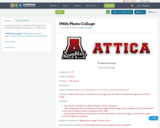
Students will create a compilation of 20 images from the 1960s and explain the significance of each image.
- Subject:
- History
- Material Type:
- Activity/Lab
- Assessment
- Diagram/Illustration
- Date Added:
- 07/14/2017

Students will create a compilation of 20 images from the 1960s and explain the significance of each image.
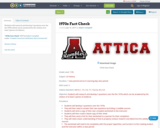
Students will research and develop 3 questions over the the 1970s which can be answered by the citation of at least 3 pieces of evidence.

This course examines the social, cultural, political, and economic history of the United States, from the Civil War to the present. It uses secondary analysis and primary documents, such as court cases, personal accounts, photographs, and films, to examine some of the key issues in the shaping of modern America, including industrialization and urbanization, immigration, the rise of a mass consumer society, the emergence of the US as a global power, and the development of civil rights activism and other major social movements.
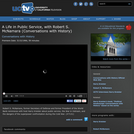
Robert S. McNamara, former Secretary of Defense and former President of the World Bank reminisces with host Harry Kreisler about public service, the War in Vietnam, and the dangers of the superpower confrontation during the Cold War. (59 min)
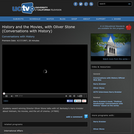
Academy award winning Director Oliver Stone talks with UC Berkeley's Harry Kreisler about Vietnam, his movies, and the art of cinema. (26 min)

The Network of Conservation Educators and Practitioners (NCEP) produces peer-reviewed teaching resources summarizing topics on conservation biology. Each module contains a synthesis document outlining the main concepts of a subject, a modifiable visual presentation, classroom exercises and solutions, teaching notes, and interdisciplinary case studies. For more information please visit where all NCEP modules are available free of charge.

The Network of Conservation Educators and Practitioners (NCEP) produces peer-reviewed teaching resources summarizing topics on conservation biology. Each module contains a synthesis document outlining the main concepts of a subject, a modifiable visual presentation, classroom exercises and solutions, teaching notes, and interdisciplinary case studies. For more information please visit where all NCEP modules are available free of charge.
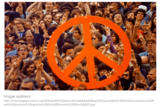
The 1960s and 70s comprised some of the most tumultuous eras in American history. The people were using their voices to express dissatisfaction with their government. This lesson provides a brief history of America’s involvement in Vietnam and surrounding areas. The focal point of the lesson is the resistance on the American homefront. In this lesson, you will discover first-hand how men were drafted for the Vietnam War and understand the draft’s role in the anti-war movement of the 1960s and 70s. You will analyze and interpret multiple primary source documents to consider anti-war sentiment in the United States. StandardsCC.8.5.11-12.A: Cite specific textual evidence to support analysis of primary and secondary sources, connecting insights gained from specific details to an understanding of the text as a whole.CC.8.6.11-12.A: Write arguments focused on discipline-specific content.

This seminar has three purposes. One, it inquires into the causes of military innovation by examining a number of the most outstanding historical cases. Two, it views military innovations through the lens of organization theory to develop generalizations about the innovation process within militaries. Three, it uses the empirical study of military innovations as a way to examine the strength and credibility of hypotheses that organization theorists have generated about innovation in non-military organizations.
![Lenses of Vietnam: Protest in a Democracy [Inquiry Design Model (IDM) Unit Plan]](https://img.oercommons.org/160x134/oercommons/media/courseware/lesson/image/22Photograph_of_a_Female_Demonstrator_Offering_a_Flower_to_a_Military_Police_Officer22_by_Albert_R._Simpson_uOQkEc8.gif)
This inquiry takes students through an analysis and evaluation of the Compelling Question “Is protest important in a democracy?” using the Vietnam War as a lens to approach the topic. To accomplish this, students will become more media literate through evaluating sources, biases, perspectives, and the goals of creating media. Throughout the inquiry, students will engage in activities designed to promote and develop media literacy while analzying the Compelling Question and learning about the historical protests of the Vietnam Era.This inquiry is expected to take two weeks (10 periods) to complete: one 45-minute class period to stage the question, introduce the inquiry, and to review media literacy; two 45-minute class periods for each of the three supporting questions; and then three 45-minute class periods for students to write and research their argumentative thesis. If students are as of yet less familiar with media literacy, the instructor should add at least another class period, or more, introducing them more fully to this.The full unit, along with all materials and resources, is available as a PDF attachment.
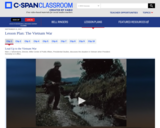
The Vietnam War was a conflict between communist North Vietnam and South Vietnam that began in 1955. However, the war took on a greater worldwide significance within the backdrop of the Cold War between the United States and Soviet Union. The United States involvement began as only sending military advisors, but continued to increase until they sent combat troops in 1965, and did not end until the signing of the Paris Peace Accords in 1973. However, the war did not officially end until the fall of Saigon in 1975. The involvement of the United States was very controversial within the country, and led to a large anti-war movement. In this lesson, students will learn about the causes, events, and impact of the Vietnam War within the United States and around the world.
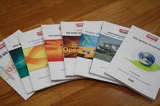
During past 20 years, OCW/OER movement has had global impact since the educational resources are shared for free on the Internet. Logically, developing countries like Vietnam should get the best from OCW/OER as they are free to use the high quality and up-to-date materials from well-known universities and research institutions in the developed countries. However, the differences in learning and teaching methodologies as well as the language barrier make it difficult to adopt open resources. Therefore, it is necessary for each OCW/OER adopter to develop a suitable model to fit with specific situations.
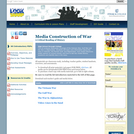
This kit analyzes Newsweek coverage of the Vietnam War, Gulf War and the War in Afghanistan. Students will learn core information about the wars in Vietnam, the Persian Gulf, and Afghanistan, how media influences public opinion of current events, and how to ask key media literacy questions and identify bias in the news.
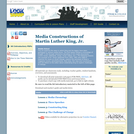
This kit explores the ways in which King and his legacy have been portrayed in various media forms. The first lesson follows a chronology of King's life through interactive decoding of rich media documents (comic books, billboards, songs, music videos, etc.). The following lessons use excerpts of Dr. King's speeches from 1963, 1967 and 1968 to examine his views on social change; explore the portrayal of King in magazine covers, advertisements, Web sites, film clips and monuments; and use letters to the editor about celebrating King to explore challenges to change.
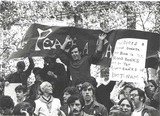
This activity includes the social structure of the United States during the War in Vietnam. Specifically, this activity focuses on how pop music influenced culture in the war effort at home and abroad. This is a part of standard 7.7 for HS United States History. Driving Q: Vietnam was a time in America with great social unrest among youth, adults, the government, and everyone in between. With the rising conflicts of the time, music became a prominent aspect of expression. Protest songs crowded the Billboard charts and the record stores. What effect did pop music have on the Vietnam War? - This question causes students to go on an in depth journey to the past to discover music, history, and the effect it had on America. This is relevant because it focuses on social unrest in Vietnam Era America which tackles standard 7.7. This question is entirely based on the amount of research and the side that the students take on the topic, therefore the students could all have different answers. As a teacher I always like to go "full circle" with what we learned in class for the day. So in terms of the driving question, I would ask at the beginning of class What effect did pop music have on the Vietnam War? and then reiterate the question at the end of class. This allows the students to have the question in mind while we go through the whole lesson, so by the end they have complete and well developed thoughts on the topic at hand. Grabber: I would open with Robin Williams yelling “GOOOOOOD MORNING VIETNAM!” Then I would play a quick video of samples capturing the music made during Vietnam War. This grabber hooks the learner because of the relationship most stuents aleady have with Robin Williams as an actor and with the music being played. The grabber conjures up a natural engagement from the students by using a high emotion situation with the booming voice of Robin Williams and the visual and audible factors in the video that draw in the audience. This is authentic and relevant because the students will often pay more attention to a lesson if they can connect with the task. The clip from the movie revolves around the whole topic of music during Vietnam because Robin Williams' character portrays a radio DJ stationed in Vietnam during the war. The videos and sounds will be straight from the vietnam era making them authentic. The Grabber's intention is to pull the students into the lesson, and with video, comedy, music, and emotion, the students will be excited and engaged for the activity. https://www.youtube.com/watch?v=AwSra5p8MDw https://www.youtube.com/watch?v=4g6YEUV4Vqw

This course examines different types of violent political conflict. It compares and contrasts several social science approaches (psychological, sociological, and political) and analyzes their ability to explain variation in outbreak, duration and outcome of conflict. Incidents such as riots in the U.S. during the 1960's, riots in India, the Yugoslav wars, and the Russian Revolution, as well as current international events are discussed.
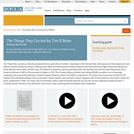
This collection uses primary sources to explore Tim O'Brien's novel, The Things They Carried. Digital Public Library of America Primary Source Sets are designed to help students develop their critical thinking skills and draw diverse material from libraries, archives, and museums across the United States. Each set includes an overview, ten to fifteen primary sources, links to related resources, and a teaching guide. These sets were created and reviewed by the teachers on the DPLA's Education Advisory Committee.

A Virtual Trail Tour of the Collections at AHEC

U.S. History is designed to meet the scope and sequence requirements of most introductory courses. The text provides a balanced approach to U.S. history, considering the people, events, and ideas that have shaped the United States from both the top down (politics, economics, diplomacy) and bottom up (eyewitness accounts, lived experience). U.S. History covers key forces that form the American experience, with particular attention to issues of race, class, and gender.Senior Contributing AuthorsP. Scott Corbett, Ventura CollegeVolker Janssen, California State University, FullertonJohn M. Lund, Keene State CollegeTodd Pfannestiel, Clarion UniversityPaul Vickery, Oral Roberts UniversitySylvie Waskiewicz
